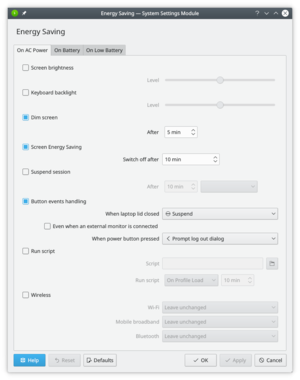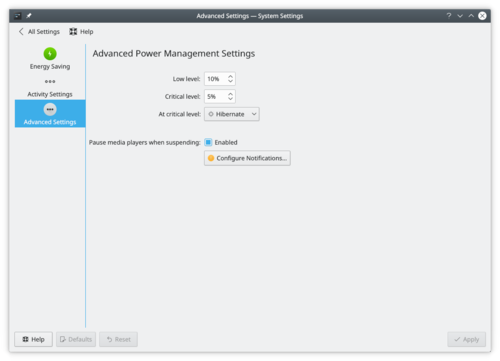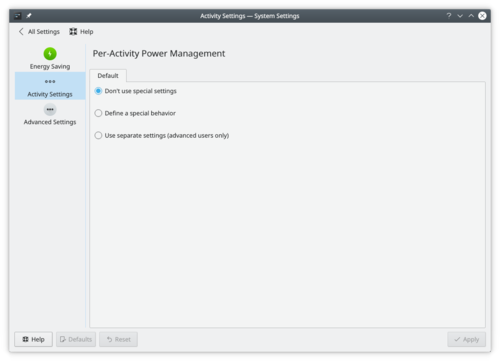System Settings/Power Management/en: Difference between revisions
Updating to match new version of source page |
Importing a new version from external source |
||
| (One intermediate revision by the same user not shown) | |||
| Line 9: | Line 9: | ||
'''Power Devil''' is configured by accessing <menuchoice>System Settings -> Hardware section -> Power Management</menuchoice>. The first screen, shown above, allows you to configure the appropriate actions according to power state. You can set the action that system should take after having spent a specific time in each state (e.g. dim display after 10 minutes on battery) or upon an event (e.g. sleep when laptop lid closes). | '''Power Devil''' is configured by accessing <menuchoice>System Settings -> Hardware section -> Power Management</menuchoice>. The first screen, shown above, allows you to configure the appropriate actions according to power state. You can set the action that system should take after having spent a specific time in each state (e.g. dim display after 10 minutes on battery) or upon an event (e.g. sleep when laptop lid closes). | ||
[[Image:PowerDevil2.png|center|500px|thumb]] | [[Image:PowerDevil2.png|center|500px|thumb]] | ||
The <menuchoice>Advanced Settings</menuchoice> tab is where you set your parameters for battery levels, and also decide what action you want to take place when the battery reaches a critical level. It is also the place where you can configure notifications. Like the case of the majority of KDE applications, you can set a sound or a flag as the way you want to be notified, or nothing at all. | The <menuchoice>Advanced Settings</menuchoice> tab is where you set your parameters for battery levels, and also decide what action you want to take place when the battery reaches a critical level. It is also the place where you can configure notifications. Like the case of the majority of KDE applications, you can set a sound or a flag as the way you want to be notified, or nothing at all. | ||
[[Image:ActivitySettings.png|center|500px|thumb]] | [[Image:ActivitySettings.png|center|500px|thumb]] | ||
In latest KDE versions, tab <menuchoice>Activity Settings</menuchoice> has been added. It allows you to configure different power settings per activity. | In latest KDE versions, tab <menuchoice>Activity Settings</menuchoice> has been added. It allows you to configure different power settings per activity. | ||
[[Category:System]] | [[Category:System]] | ||
Latest revision as of 11:00, 3 February 2019
 |
Power Devil allows you to define your all power settings |
Global Settings
Power Devil is configured by accessing . The first screen, shown above, allows you to configure the appropriate actions according to power state. You can set the action that system should take after having spent a specific time in each state (e.g. dim display after 10 minutes on battery) or upon an event (e.g. sleep when laptop lid closes).

The tab is where you set your parameters for battery levels, and also decide what action you want to take place when the battery reaches a critical level. It is also the place where you can configure notifications. Like the case of the majority of KDE applications, you can set a sound or a flag as the way you want to be notified, or nothing at all.

In latest KDE versions, tab has been added. It allows you to configure different power settings per activity.
